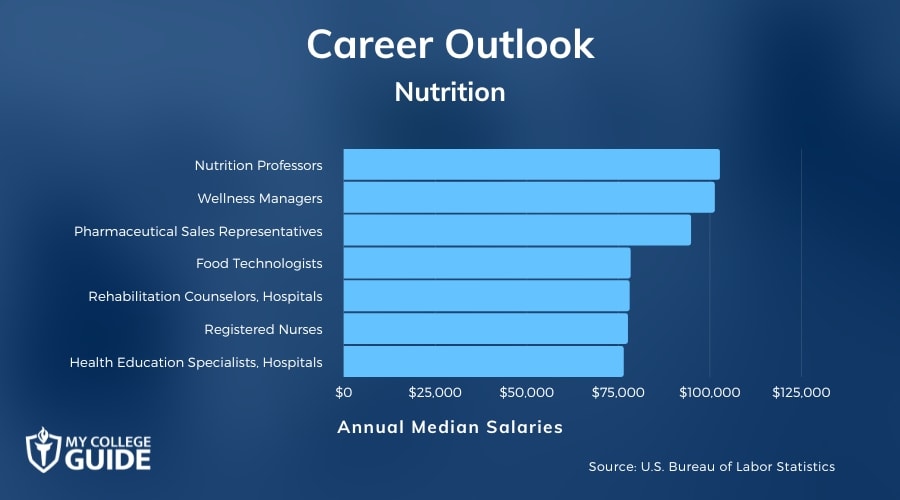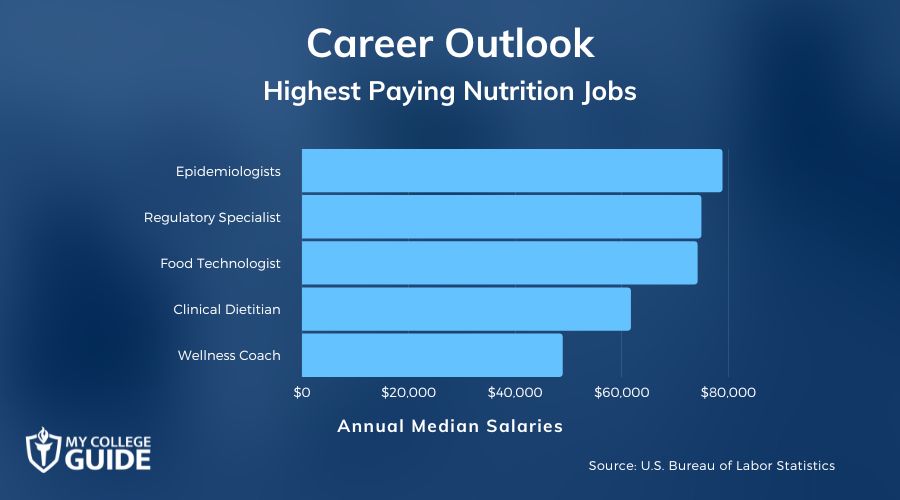If you’re interested in nutrition careers, then a degree in nutrition can be a good starting point.

There are many career ideas in nutrition specifically within the food industry, as a private consultant, or with public health services, available to those with nutritional knowledge and certification.
Editorial Listing ShortCode:
If you want to dedicate your career to helping other people improve their health through the principles of a healthy diet, nutrition could be the right path for you.
What Can You Do With a Degree in Nutrition?

In the information above, you can see that there are a number of jobs available to those with a degree in Nutrition.
With industries that range from food service to healthcare and education, the skills that you learn throughout your program will help you take on important roles in helping people maintain a healthy lifestyle. As can be expected, with the wide variety of occupations in nutrition there is also a wide range of average annual salaries.
Editorial Listing ShortCode:
While entry-level food service positions may only pay minimum wage, there are a number of professional careers in nutrition that offer salaries well above the national average across all occupations. For example, according to the U.S. Bureau of Labor Statistics (BLS), food scientists can make up to $74,160 per year while a Pediatric Dietitian could earn up to $61,650.
Depending upon your specific skills, experience, and industry, you may make more or less than the numbers shown above.
10 Things You Can Do with a Degree in Nutrition
There are many careers in wellness and nutrition that may align with your overall professional interests. Consider these possible careers in wellness and nutrition, including projected 10-year growth projections from the BLS:
1. Food Scientists and Technologists

Education Requirement: Masters or doctorate. Certification may be required in some states.
Projected Job Growth: 8%
Food scientists apply their knowledge of microbiology and chemistry and apply it to understanding how what we eat impacts our wellness.
Professionals in this field may analyze food for nutritional content, as well as discover methods for safe handling and preparation. They may also collaborate with food producers to determine how to best process food products for consumption.
2. Nutritionist

Education Requirement: Master’s degree may be required for certification.
Projected Job Growth: 11%
Nutritionists work with individuals to help them make choices that benefit their health and lifestyle. They may work with a variety of populations.
Some areas of specialization include sports nutrition, pediatric nutrition, and weight management. Nutritionists are often employed in healthcare facilities, doctor’s offices, and sports and athletic facilities.
3. Nutrition Writer

Education Requirement: Varies.
Projected Job Growth: 9%
A nutrition writer is a person who writes, publishes, and shares documents regarding food and wellness from a professional perspective. Nutrition career paths in writing may vary, depending on the type of writing
Those who plan to work with scientific or respected health and wellness resources often have a minimum of a bachelor’s degree in nutrition. Those who work as freelancers may find educational requirements vary by client.
4. Food Safety Auditor

Education Requirement: Bachelor’s degree; certification may be required by states.
Projected Job Growth: 7%
Under the employment umbrella of Occupational Health and Safety Specialists and Technicians, food safety auditors are responsible for inspecting the facilities that process and manufacture our food.
Some professional food safety auditors specifically inspect restaurants for sanitation and overall cleanliness. Individuals in this profession may work for the Federal government, or be employed by individual manufacturing plants.
5. Health Educator

Education Requirement: Master’s degree in health education.
Projected Job Growth: 17%
Health educators work with communities and individuals to provide them with helpful information regarding health and wellness. This can include information about healthy behaviors and diet choices.
Editorial Listing ShortCode:
Popular employers of health educators include public health centers, non-profit community organizations, hospitals, and other healthcare facilities. Those who work as health educators are often responsible for creating and delivering educational programs and coordinating outreach efforts.
6. Health Coach

Education Requirement: Bachelor’s degree, along with certifications.
Projected Job Growth: 17%
Health coaches frequently work one-on-one with individuals who are interested in learning how to work towards an overall wellness goal.
In this job, professionals often assess their clients’ overall wellness, then provide them with a plan to help them reach their goals. This plan can encompass an individual’s diet, exercise, and mental health. Health coaches may be employed by private clients, as workplace resources, or in care facilities.
7. Dietitian

Education Requirement: Bachelor’s degree, along with state licensing.
Projected Job Growth: 11%
Dietitians are licensed professionals who work with individuals to manage health conditions and challenges through the food they eat.
Many dietitians work in a clinical setting, such as a hospital, care facility, or rehabilitation center. They frequently coordinate with doctors to help analyze dietary concerns and progress through their plans.
8. Medical and Health Services Manager

Education Requirement: Bachelor’s or master’s degree.
Projected Job Growth: 28%
These individuals are responsible for creating and managing medical and health-oriented programs for hospitals, healthcare facilities, and private medical practices.
The responsibilities of a medical and health services manager may include managing staff and budgets while designing programs and policies for the entire facility. As a result, they may have a background in health and wellness topics as well as business.
9. Nutrition Professor

Education Requirement: Doctorate level degree in nutrition education.
Projected Job Growth: 12%
Those who wish to teach at the post-secondary level may wish to consider a role as a nutrition professor. In this role, you’ll connect with students to educate future nutrition majors and health professionals.
Whether you choose to work at a community college or a four-year university, your role as a professor will likely include creating and implementing lesson plans for a variety of nutrition-related courses.
10. School Counselor

Education Requirement: Master’s degree in counseling or psychology.
Projected Job Growth: 10%
School counselors at all grade levels may work with students who are experiencing an unhealthy relationship with food. They may also coordinate with health educators to provide mentally healthy perspectives on diet and nutrition.
Editorial Listing ShortCode:
These professionals may also help connect students with additional resources to help them make healthy diet choices or work with a specialist to address their concerns.
Online Nutrition Degrees

When researching jobs for nutrition degree holders, it’s a good idea to consider what type of degree is required for each career path.
Individuals can concentrate on nutrition at a variety of levels of education. In many cases, professions will require one of the following:
- Bachelors in Nutrition: This often serves as a starting point for those who are interested in careers in wellness and nutrition. Jobs for nutrition majors may include entry-level positions in healthcare settings.
- Masters in Nutrition: Those whose career goals include certifications or licenses may be asked to complete masters-level education. Additionally, some clinical and leadership-type positions require this level of education.
- Doctorate in Nutrition: Individuals who hold a doctorate in nutrition are considered experts in this field. Generally speaking, a doctorate-level education is required for advanced scientist and post-secondary teaching roles.
When considering what can you do with a nutrition degree, you may wish to review the level of education required for each prospective career path. This can help you plan for each step in meeting your goal.
Nutrition Careers & Salaries

We’ve put together a list of the top 40 nutrition careers & salaries, as well as their median annual salaries according to the U.S. Bureau of Labor Statistics to give you an idea of what to expect when entering the professional workforce:
| Careers | Annual Median Salaries |
| Nutrition Professors | $102,720 |
| Wellness Managers | $101,340 |
| Pharmaceutical Sales Representatives | $94,840 |
| Food Technologists | $78,340 |
| Rehabilitation Counselors, Hospitals | $78,070 |
| Registered Nurses | $77,600 |
| Health Education Specialists, Hospitals | $76,450 |
| Dietitians, Outpatient Care Facilities | $74,640 |
| Youth Program Directors | $74,000 |
| Recreation and Fitness Studies Teachers, Postsecondary | $72,440 |
| Registered Nurses, Nursing and Residential Care Facilities | $72,420 |
| Animal Nutritionists | $65,090 |
| Dietitians, Hospital | $61,820 |
| Public Health Nutritionists | $61,650 |
| Public Health Social Workers | $60,840 |
| Certified Diabetes Educators | $60,600 |
| Social and Community Service Managers, Nursing and Residential Care Facilities | $60,590 |
| Food Service Managers | $59,440 |
| Health Education Specialists, Outpatient Care Centers | $54,060 |
| Social Workers | $50,390 |
| Sous Chefs | $50,160 |
| Community Health Workers, Hospitals | $49,240 |
| Child, Family, and School Social Workers | $49,150 |
| Health Education Specialists | $48,860 |
| Certified Athletic Trainers | $48,420 |
| Licensed Practical and Licensed Vocational Nurses | $48,070 |
| Recreational Therapists | $47,940 |
| Health Education Specialists, Individual and Family Services | $47,040 |
| Health Technologists and Technicians | $46,910 |
| Community Health Workers | $46,590 |
| Rehabilitation Counselors | $45,760 |
| Personal Chefs | $42,920 |
| Personal Trainers | $40,700 |
| Community Health Workers, Outpatient Care Centers | $39,600 |
| Quality Control Inspectors | $38,580 |
| Kitchen Supervisors | $36,570 |
| Specialty Cooks | $30,010 |
| Cooks, Institution and Cafeteria | $29,910 |
| Recreation Workers | $29,680 |
| Dietary Technicians | $29,520 |
In the last several years, people have become more aware of the benefits of making healthy choices for their diet and overall lifestyle. Due to this, those who work in the field have an overall positive nutrition career outlook.
According to the U.S. Bureau of Labor Statistics, dietitians and nutritionists are projected to have a 7% employment increase over the next 10 years, which is much faster than the national average. For those with a passion for healthy living and a desire to help others modify their diets to enjoy the benefits of good health, a degree in nutrition can be a great start to a rewarding career.
Editorial Listing ShortCode:
Whether you want to teach others about nutrition or consult with clients in the healthcare setting, your degree will help pave the way to a variety of exciting career opportunities.
You can also view our Careers in Nursing and Careers in Political Science guides for more options.
How to Know if a Degree in Nutrition is Right for Me

A degree in nutrition is more than knowing how various foods impact an individual’s overall health and wellness. In fact, there may be many factors at play when deciding whether or not a degree in nutrition is the best educational path for your long-term goals.
You may find a degree in nutrition appealing if you enjoy:
- The science of food, including the chemistry and biology behind what we eat and how it is made
- Analyzing medical data to understand conditions and measure nutritional requirements
- Researching nutritional methodology, diet planning, and strategic health management
- Connecting and communicating with a variety of individuals in an educational role
- Creating goal-oriented plans with individuals, and establishing a system for measuring success
- Understanding physical and psychological relationships between people and food, including cultural traditions
Many nutrition career paths center around these particular skills. As a result, those who pursue a degree in nutrition will frequently encounter courses that help finesse these core skills.
Is Financial Aid Available?

Nutrition students who are interested in needs-based financial assistance may wish to complete the Free Application for Federal Student Aid (FAFSA). This is the first step in determining if you are eligible for Federal assistance.
Some schools also provide scholarships and grants. You may wish to review each school’s financial aid information to determine what options you may qualify for. There may also be an application process for these awards. Additionally, your employer may offer tuition reimbursement or educational assistance for those continuing their education.
Nutrition Licensure and Certifications

The types of licenses or certifications required to work in food and nutrition careers depend on the profession. Additionally, these requirements are often set by the state, so you may wish to research the specific requirements for the state in which you plan to start your career.
The Commission on Dietetic Registration (CDR) offers certifications in specific areas of care, including pediatric and gerontological nutrition. The CDR also offers specialized certifications, such as sports nutrition and weight management.
Those who choose to work as nutritionists may wish to pursue certifications such as certified clinical nutritionist (CCN) and certified nutrition specialist (CNS). Both the CDR and CCN require a bachelor’s degree, but the CNS requires a master’s degree.
What Is a Nutrition Degree?

A nutrition degree is a course of study that teaches you fundamental skills needed to understand the science of health and how food affects our overall wellbeing.
With this knowledge, you will be able to assist private clients and healthcare patients with improving their lives through dietary modifications. You will take several diverse courses throughout your degree program to help you learn the skills needed to succeed in the professional workplace.
These classes may include the following:
- Nutritional Counseling
- Community Nutrition
- Complementary and Alternative Nutrition Therapies
- Food Safety and Microbiology
- Nutritional Analysis and Planning
If you would like to explore the possibility of earning your degree from home, check out the online nutrition degrees available from many top universities. These flexible programs let you work towards your degree at a pace that fits into your busy personal schedule.
What Skills Do You Learn in Nutrition?

A nutrition degree will include courses that help develop skills in communication, behavior change motivation, scientific research, and analytics.
In many nutrition career paths, professionals must provide education and set expectations with their patients or clients. This means understanding how to communicate clearly and effectively, along with understanding an individual’s challenges and concerns.
Editorial Listing ShortCode:
Conducting research and reviewing progress are both very important parts of many jobs in nutrition. Students will be encouraged to learn and practice research methods, as well as data interpretation. As a science-based degree program, nutrition students are also tasked with reviewing and analyzing data to measure progress and change.
Strong organization skills are also recommended for those who are interested in nutrition professions, as they frequently work with a variety of individuals who have their own unique concerns.
Where Do Nutrition Majors Work?

Nutrition majors may work in a variety of settings, depending on their professional goals. Some nutrition professionals, such as food auditors and food scientists may work directly for the government, via the United States Department of Agriculture (USDA) or Food and Drug Administration (FDA).
Health educators may work in schools, healthcare facilities, community centers, or non-profit organizations. Nutritionists and dietitians may work in conjunction with a medical facility, or healthcare service provider, or establish their own business. Nutrition majors may also work in the sports industry, helping athletes of all levels maintain wellness.
How Much Does a Nutritionist Make?

According to the BLS, nutritionists and dietitians across the United States received a median annual pay of $61,650.
Other jobs for nutrition majors vary in pay. The BLS notes that health education specialists have an annual median salary of $60,600. Post-secondary educators have a median pay of $79,640 per year. Note that these figures can fluctuate based on role, geographic location, and experience.
What Are the Highest Paying Nutrition Jobs?

The pay rate for different food and nutrition careers can vary, but the BLS notes that some of the higher-paid roles across the country include:
- Epidemiologists: $78,830 per year
- Regulatory Specialist: $74,870 per year
- Food Technologist: $74,160 per year
- Clinical Dietitian: $61,650 per year
- Wellness Coach: $48,860 per year
Other factors, such as your level of experience, employer, and geographic location may impact the salary offered for various nutrition roles.
What’s the Difference Between a Dietitian vs. Nutritionist?
Dietitians and nutritionists have very similar roles in educating people about food and diet. Differences between these roles include:
| Dietitian | Nutritionist |
|
|
While educational goals may be similar, dietitians are more strictly regulated.
Is a Nutrition Degree Worth It?

Yes, a nutrition degree is worth it for many professionals. While becoming a dietitian or nutritionist may be the first profession you think of, there are many different jobs for nutrition degree holders.
Nutrition professionals work as scientists, consultants, educators, or regulators who keep consumers safe from food safety concerns. They may establish their own business, serving a specific clientele, or they may work for hospitals and other health-related facilities.
Editorial Listing ShortCode:
Job growth in this field continues to grow as well. Health education specialists and community health workers are expected to see a 12% growth over the next decade. Dietitians and nutritionists are projected to see a 7% growth over the same time period.
For those who are interested in helping individuals gain a meaningful understanding of health, wellness, and nutrition, a nutrition degree may be the first step toward a meaningful career.
Getting Your Nutritionist Degree Online

Nutrition is an important part of everyone’s daily life, which is why many career opportunities in this field are experiencing rapid growth.
If learning the biological and chemical role food plays in our lives is an area of interest, you may wish to pursue a nutritionist degree online. There are other additional career paths that those with a degree in nutrition may wish to pursue, as well.
If you have a passion for helping others and an interest in how health and diet connect, take a look at some of the nutrition degree programs offered online today.
